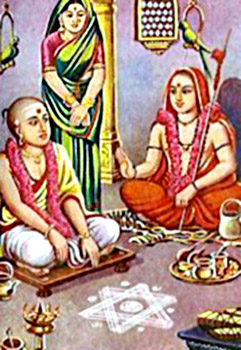 Mandana Mishra (650-700 CE) was a follower of the Karma Mimamsa School of philosophy. He was a staunch champion of the sphota doctrine of language. He was a theorist of Pui Mimamsa ritualism and non-dualist Advaita Vedanta whose most important work is the Brahmasiddhi. His vision is that there is a single reality underlying everything. It is just undifferentiated consciousness. Differences are not the ultimate realities. Finite individuals are subject to a distorted world-view that hides the reality by imposing diversity upon it.
Mandana Mishra (650-700 CE) was a follower of the Karma Mimamsa School of philosophy. He was a staunch champion of the sphota doctrine of language. He was a theorist of Pui Mimamsa ritualism and non-dualist Advaita Vedanta whose most important work is the Brahmasiddhi. His vision is that there is a single reality underlying everything. It is just undifferentiated consciousness. Differences are not the ultimate realities. Finite individuals are subject to a distorted world-view that hides the reality by imposing diversity upon it.
He became a disciple of Adi Sankara later on. He lived in the ancient Indian town of Mithila. He believed in rituals and performed all the ritualistic duties as mentioned in the Vedas. He was a formidable exponent of ritualism. When he was defeated by Adi Sankaracharya in a religious debate, he and his wife became disciples.
Avidya is responsible for the appearance of differences between selves, cognitions and objects. Sorrow, delusion and passion are related to Avidya. One`s true nature is concealed, creating the illusion that one is an individual agent which is the root reason for rebirth. Mandana opined that all vedically enjoined action is pure and influences one towards realisation of one`s true identity. He believes that release from rebirth requires a combination of knowledge and ritual action. Renouncing all ritual actions is a path to self-realisation.
Mandana has often been identified with Suresvara which is a strong tradition in Hinduism. Advaita is slightly different according to Mandana Mishra in certain critical details. He was one of the four main devotees of Sankara and the first head of Sringeri Mutt, one of the four mathas that Sankara had established later. His major works include Vidhiviveka, Sphota-vada and Mimansaanukramanikaa.
This article is a stub. You can enrich by adding more information to it. Send your Write Up to content@indianetzone.com



















